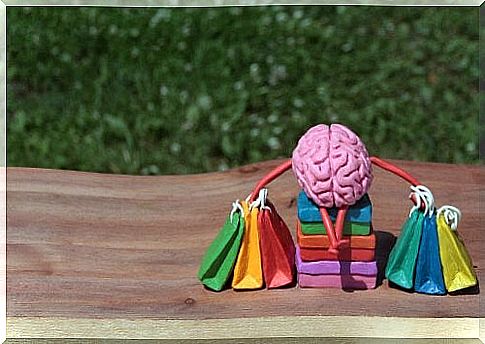The Diderot Effect, Or The Constant Need To Buy More

Most of us buy more than we really need. While this is not the case for everyone, many people spend more than their income level allows. There are several reasons for this, but one of the most interesting is the Diderot effect.
Understanding how our mind works and why we act the way we do (and not the other way around) is fundamental to changing our problematic behaviors. Therefore, understanding the Diderot effect and the power it has over us can help us reduce our level of spending. In this article, we will study this psychological effect and give some ideas to identify and combat it.
What exactly is the Diderot effect?
The Diderot effect was first described in the 18th century by the French philosopher of the same name. This thinker realized that the acquisition of one new thing can suddenly lead to the purchase of several more. Concerned about the expenses he deemed unnecessary, he began to study what was going on; later at the end of the twentieth century, anthropologist Grant McCracken deepened his work.
One of the most important discoveries is that the objects we have are directly related to our identity. So our possessions and what we think about them also influence things as angular as our self-image or our self-esteem.

McCracken believed that when we buy a new thing, the dissonance that can occur if that thing is very different from the others we already own can make us very uncomfortable. For this reason, we will often tend to acquire new things that are more related to the first thing we bought or to what we already have.
This is therefore the Diderot effect. To better understand it, we will see an example described by Denis Diderot himself during his research on the subject.
Example: The bathrobe
An event motivated the discovery of the Diderot effect. What unexpectedly changed the life of the French philosopher. He tells the story of how an innocent gift brought him to ruin.
Diderot says receiving a precious scarlet bathrobe as a gift brought him unintended consequences. At first, the philosopher was delighted with his new acquisition. However, he realized that the rest of his possessions were nowhere near as stylish.
Thus, Diderot relates that he soon began to replace his old possessions. He exchanged his old wooden chair for a comfortable chair with a leather seat. He replaced the paintings in his house with much more expensive paintings. Gradually, he spent more and more money on elegant items to match his new dressing gown.
Almost without realizing it, the man ends up spending all his money. And this in goods that he did not really want to own. This is the prime example of what the Diderot effect can lead us to do if we let it control our decisions. However, can we do anything to combat it?

How to fight against this phenomenon
Below are several keys to avoid the worst consequences of the Diderot effect:
- Realize what’s going on: When we are aware of what we are doing, negative thoughts have less of an effect on us. Therefore, before you buy expensive things, ask yourself if you really want them, if you really need them.
- Analyze the costs of future purchases: each item in itself does not necessarily represent a significant expense. But how much are you going to pay if you get everything you want right now? Instead of getting carried away every time, it’s much more useful to figure out in advance how much you can spend and what you want to do.
- Buy things for their usefulness rather than their status: the most important criterion for acquiring something new is whether it will be useful to you. Acquiring something for its looks more than its usefulness can be very addicting. But, unless you have a lot of money to spend, it usually doesn’t make sense.
In conclusion, keeping the Diderot effect at bay can be complicated. However, if you are aware of what you are doing and reduce your motivation to impress others, you will quickly realize that you no longer need to make hundreds of new purchases just because of the status your new acquisitions can give you. , or to be in tune with others.










